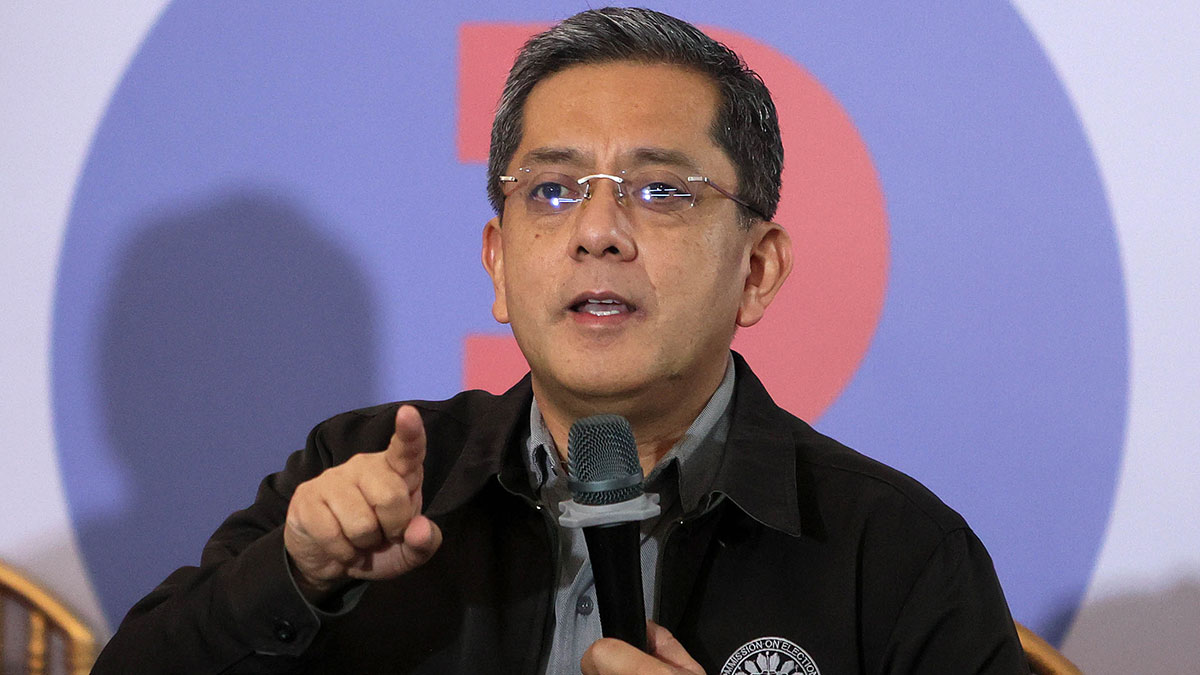Comelec: No stopping BARMM elections

Commission on Elections chief George Garcia — Photo by Marianne Bermudez
The Commission on Elections (Comelec) has assured voters in the Bangsamoro Autonomous Region in Muslim Mindanao (BARMM) that the Oct. 13 parliamentary elections will proceed “at all costs” even as it suspended the printing of official ballots.
“To our constituents in the Bangsamoro, the elections will push through there. There needs to be a law from Congress to postpone the elections in the Bangsamoro,” said Comelec Chair George Garcia, noting that there is no current bill in Congress on the already twice-postponed political exercise in the BARMM.
The Comelec initially planned to begin printing of official ballots for Basilan and Tawi-Tawi provinces and the Special Geographic Area (SGA) on Thursday, but this was called off after the BARMM parliament announced its approval of a measure redoing the creation of 32 parliamentary districts in the region.
The measure came after the Supreme Court ruled last year that Sulu province was not part of the BARMM, as the majority of its voters rejected its charter, the Bangsamoro Organic Law, during a 2019 plebiscite.
Because of the ruling, seven parliamentary district seats allocated for Sulu had to be redistributed to the remaining administrative jurisdictions of the BARMM.
The poll body said it wanted to “further study the implications of the approved bill.”
On Tuesday night, the parliament passed Parliament Bill No. 351, allocating nine seats for Lanao del Sur, five each for Maguindanao del Norte and Maguindanao del Sur, four each for Basilan and Tawi-Tawi, three for Cotabato City, and two for the SGA.
Chief Minister Abdulraof Macacua had certified the bill as a priority legislative measure.
“This is the final act of the Parliament to ensure [that] there is an election in October,” said Member of Parliament (MP) Naguib Sinarimbo.
Redistricting
MP Sittie Fahanie Uy-Oyod said the regional lawmakers expected the Comelec to act on the redistricting bill in time for the October elections.
The poll body earlier announced that it would proceed with the parliamentary elections even without a redistricting law, which means only 73 of 80 seats would be up for contest. With the enactment of PB 351, the Oct. 13 elections will be for 80 seats.
Under the law, 40 of 80 seats are for party representatives, 32 for district representatives, and eight for sectoral representatives.
Garcia said that the redistribution of the seven seats might complicate the poll body’s preparations for the elections, noting changes in ballot faces and consolidation due to the transfer of one municipality to another district.
Garcia assured that even with the postponement of ballot printing, the Comelec’s timeline for preparations had provided leeway for circumstances like this.
He said they were reviewing if it would be possible to resume on Friday the printing of around 2.3 million official ballots for the region.
‘None of the above’
Meanwhile, election watchdog Legal Network for Truthful Elections (Lente) on Wednesday asked the Bangsamoro parliament and the Comelec to lay out a “clear” policy relating to the “none of the above” (Nota) option in the regional ballot.
In a position paper, Lente argued that voting for Nota is a “legitimate and powerful expression of dissent that registers public dissatisfaction with the choices offered.”
The group said an “ideal policy framework” involved that option having an impact on the elections, noting that it “enhances accountability, transparency and inclusiveness in the electoral process, thereby strengthening public confidence in our democratic institutions.”
“By capturing this sentiment within the official results, Nota prevents voter disengagement from being hidden in abstention or invalid ballots and instead channels it into constructive feedback for the political system,” Lente explained.
“In this sense, Nota operates as both a democratic safeguard and an instrument for building a more responsive and accountable government,” it added.
But Lente said this should not complicate the computation for the allocation of seats for the regional parliamentary political parties, as it does not fall within the definition of a political party provided for in the Bangsamoro Electoral Code.
“Therefore, only the valid votes cast for political parties shall be considered in computing the 4-percent threshold and the subsequent steps in proportionally allocating seats to parties based on the votes they received,” Lente said.
It also explained that choosing Nota should not impact the election of district representatives, as it could not be considered a “candidate.”


















